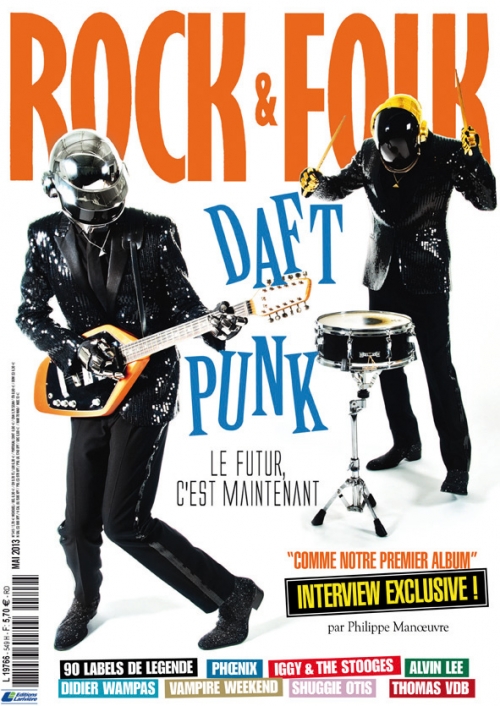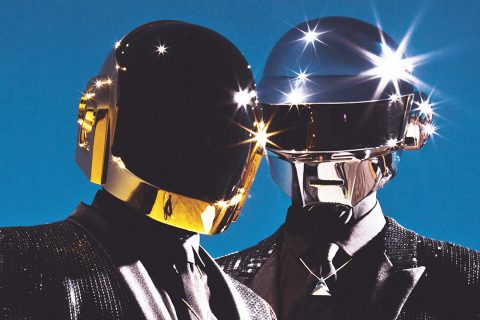
On April of 17th, Daft Punk did a French spoken interview with publication Rock N Folk magazine.
The interview focuses on both the past journey of their previous albums, their composition of Tron for Disney and the discovery process it took to get them to build the ‘Random Access Memories’. It’s interesting to discover that they had been essentially working on the album since 2008 making it almost a 5 year process! Check below
In what state of mind where when you began working on this album?
We started this disc in 2008. For a real long time, it wasn’t an album. We just made music, researching and experimentation. We weren’t saying: we’re making our fourth album. We started the project at a time where we felt disconnected from music all around us. We were a bit perplexed, more in the search. The novelty, it was to say: for the first time, we’re going to go in a recording studio. It is our first studio album, until then it was always homemade music.
Why this necessity of a studio?
There are things that we can only do in a studio, not at home. Therefore, we live in an era where music is made on portable computers. It was the idea to say: something is getting lost. Let’s go in studio, let’s contact with our idols, these musicians that made us who we are as persons… For the last five years five years, leaving out the Tron project, we were in search mode.
Listening to your album, we discover 73 minutes of creative madness.It reminded us of Todd Rundren’s A Wizard, A true Star. It’s luxurious. It is good to know that there are still bands out there that dare to do or still can do this kind of thing.
The idea of “still can”, it’s exactly that. We tried to see if it was still possible. Nobody never tries anymore. Why? Lack of material, of ambition, of wanting, even the three? In the meantime, the know-how gets lost. An economy crumbles, a general discouragement wins. And then the weight of the great classics is heavy.
Did your work for Disney on the Tron movie change your perception of music, or the business?
Totally. From an inside point of view, everything changes every time (laughs) but let’s get back to 2008… We passed the year in lock-out in a studio, we made music all day. After a year, we listen and say: “Interesting compos, but the production doesn’t follow. We throw out everything.” Disney contacts us at that moment to make the music of “Tron”. It’s not that well played at all but we accept, because we want to work with an orchestra and we like the idea to participate to a cyber-sound and light in 3D, ultra technologic and great show. After a year on Tron, after having met engineers and made a huge work on the accoustic, we come out revitalized. On find our liberty and suddenly the desire to make our own music… with musicians. “Around The World”, already, made an homage to Nile Rodgers and Bernards Edwards. But it was home-made disco. We fantasized and we decided to take the best of the gold age of funk, 1975-1982, before the arrival of the new wave and the numeric sound. We want to recreate a really warm sound with few machines and lots of the elite of musicians, drummers, bassists, guitarists. Everyone that worked ont that record were the witnesses of this magic era. The sound engineer, for instance, recorded Prince’s “Contreversy”, among others. These people transmit us a know-how, a technique, a craft that is about to vanish.
This album sounds so exceptional. It is very sophisticated. It has a heart beat in the middle of all these machine elements.
There is life. We’re talking about layers and layers of recordings.
You feature artists like Paul Williams, Julian Casablancas, Pharrell Williams. We also feel like there is some sort of homage to Michael Jackson, The Cars of Steely Dan.
You found all three. Steely Dan is a good example. One of the drummers we hired was the one of Off The Wall (JR Robinson) and of Gimme The Night of George Benson. We had the guitarist of “Thriller”, Paul Jackson Jr, in addition to Nile Rodgers. So, people connected to a certain elegance, an interpretation West Coast rooted in Los Angeles, in those famous studios were were created the Fleetwood Mac, Quincy Jones and other legends.
Twelve years later, are you satisfied that you remained loyal to the helmets?
It is hard to tell what would’ve happen for us with the anonymity. We have no regret on that subject. We have a normal life. We met when we were 12. Welistened the Velvet Underground and the Doors. We created those robot personas. We see the next generation appropriating it and it pleases us. Last year, the robots made an adidas ad with the “Star Wars” robots. Then the robots were in a “Simpsons” episode. To achieve mixing Ziggy Bolan and Star Wars and integrate pop culture while staying anonymous, it was fun. We both have a superhero ego.
Let’s talk about some rumours about you. is it true that you could pass your helmets to some actors and watch yourselves from the seats of the stadium? True or false?
It would be possible. But we make too much few concerts that it would be dumb to not be acclaimed by 20 000 persons. In 1997, it was sixteen years ago, we play at the London Astoria. We weight the scales. I leave. Many people are waiting in line to get in. And there, some dude tries to sell me tickets on his guards. In a Bunuel movie, we’d buy tickets, we’d enter and we’d wait. And then, things would happen…



Comments